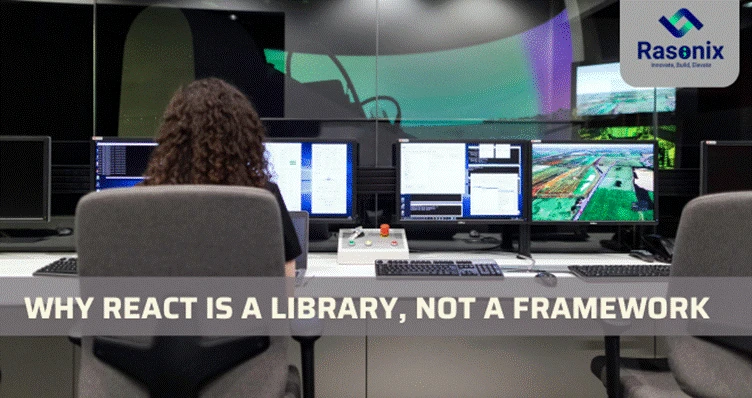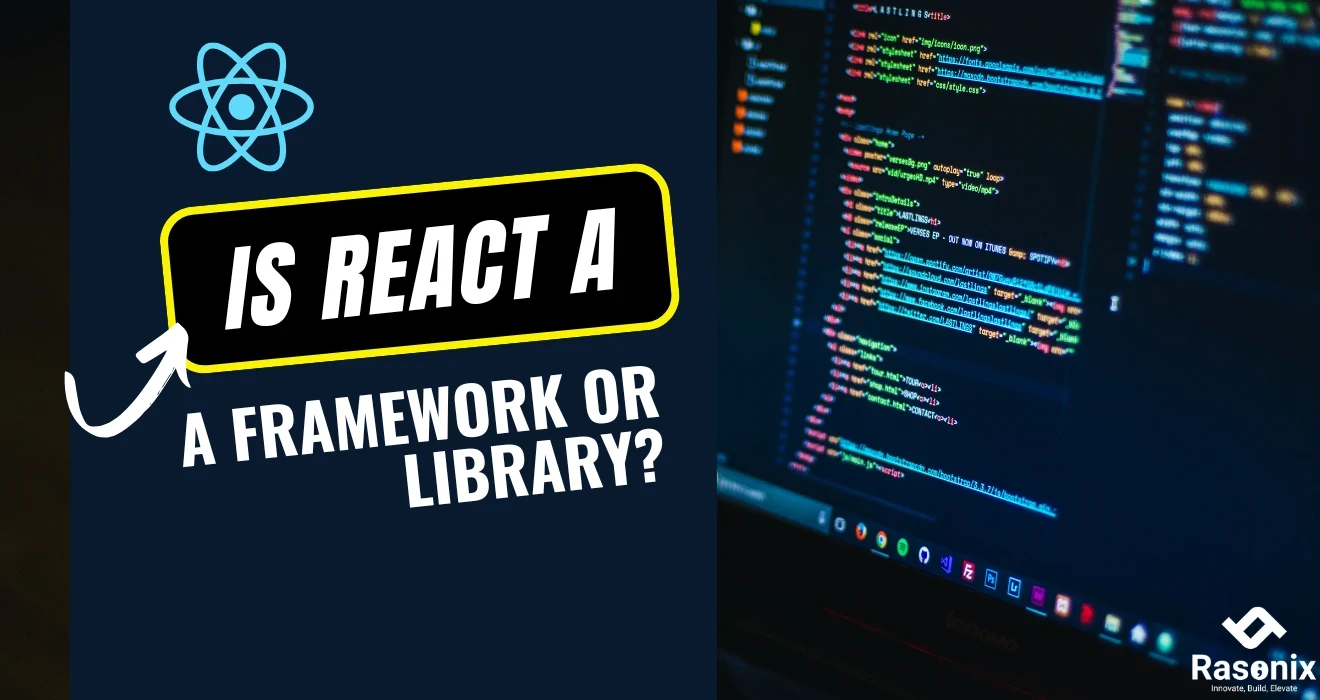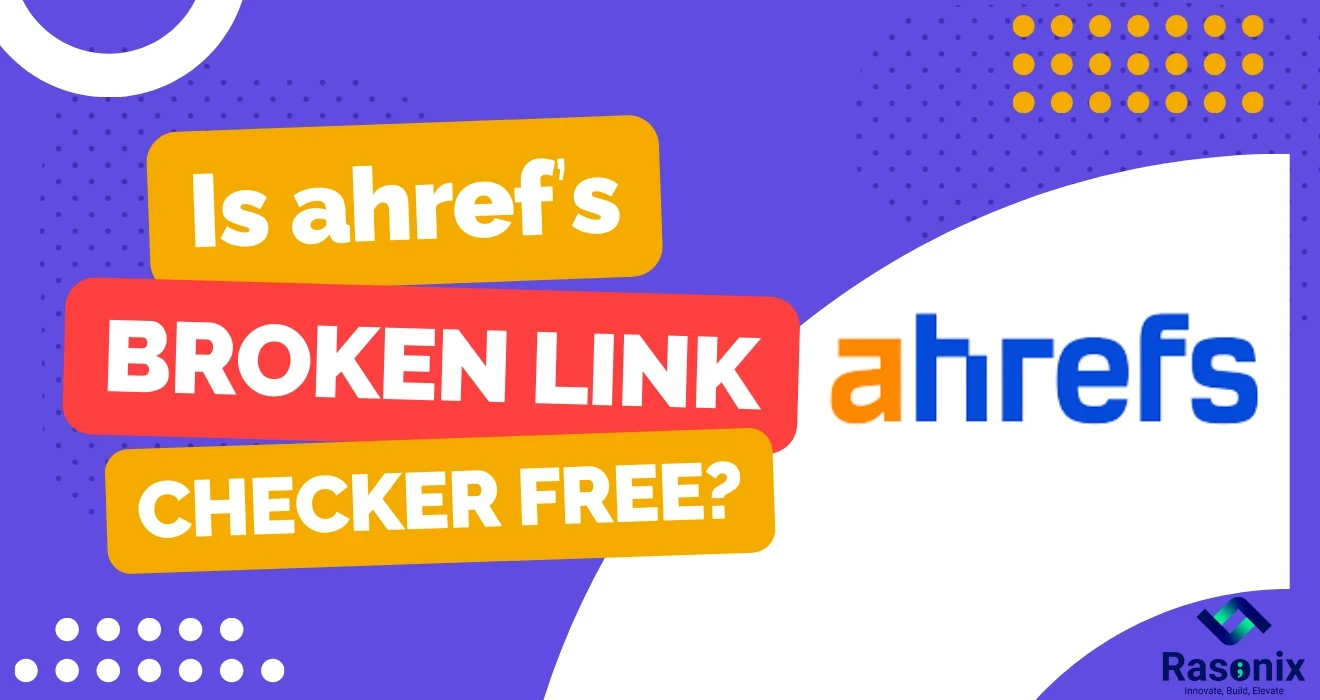You’ve heard it debated countless times in developer forums, job descriptions, and tech discussions: is react a framework or library? When I first dove into ReactJS, this question seemed trivial after all, React felt like a full system: create-react-app, JSX, component lifecycle, hooks, context, routing with React Router…
But as I built more React website projects and compared alternatives like Angular and Vue, I realized the nuance was crucial. In this guide, I’ll draw from my journey to settle is react a framework or library once and for all, and explain why understanding this distinction shapes your React JS development strategy.
Framework vs Library: Defining the Core Difference
|
Difference
|
Library
|
Framework
|
|
Meaning
|
Before answering a framework or library, we need clear definitions to set the stage.
A library is a collection of pre-written code (functions, classes, modules) that developers can call upon to perform specific, well-defined tasks. You remain in control of the application flow, deciding when and how to integrate its functionalities into your code. This embodies the fundamental software library vs framework difference.
|
A framework is a comprehensive, structured scaffolding that provides a foundational structure for building applications. It typically includes libraries, tools, and a predefined architecture. Unlike a library, a framework dictates the application's overall flow and calls your code via its own hooks or lifecycle methods.
|
|
Analogy
|
Think of a library like a specialized toolbox. You pick the specific tool (function/module) you need for a particular job, but you remain in full control of how you use it and the overall workflow.
|
Imagine a framework as a house blueprint or a car chassis. It provides the core structure and rules. You 'fill in the blanks' according to its specifications, and it largely dictates how your components interact and where they fit. This defines the core framework vs library contrast.
|
|
Examples
|
jQuery (for DOM manipulation), Lodash (for utility functions), Axios (for HTTP requests).
|
Angular, Ruby on Rails, Django
|
Is React a Framework or Library?
When I began my first React side-project, the question of a framework or library hovered in my mind. I used create-react-app to scaffold, added Redux for state, React Router for pages, and even Tailwind for styling. The ecosystem felt like a framework: routing, state management, testing, bundling everything batteries included.
But at each step, I had to choose and integrate each tool myself. That’s a hallmark of a React library. This evolving confusion around how a framework or library nearly led me to pick the wrong tool for a client project.
Why React Is a Library, Not a Framework

Let's address react as a framework or library directly. React is fundamentally a JavaScript library for building user interfaces.
First, what is React JS? React.js is a declarative, efficient, and flexible JavaScript library for building user interfaces, primarily focused on rendering and managing the view layer for single-page applications.
Now, here's why React is a library:
● Focused Scope: React’s single responsibility is the View layer. Unlike Angular, an undisputed framework, React doesn’t enforce how you handle data fetching, global state, or routing. It doesn't impose an entire application architecture.
● You Call React: You, the developer, import React and explicitly call ReactDOM.render() (or createRoot().render() in modern React). React won’t bootstrap your entire app flow; you remain in command of the overall application structure. This directly supports why it is a library and not a framework.
● Ecosystem Flexibility: React thrives on being combined with other tools. You pick:
● State Management: Redux, Zustand, or React’s Context API.
● Routing: React Router.
● API Calls: Axios, Fetch API.
● Styling: CSS Modules, CSS-in-JS (like styled-components), Tailwind CSS.
● Testing: Jest, React Testing Library.
This freedom to assemble your own stack underscores why react is a library and not a framework, it gives you choice, at the cost of assembling and integrating your own set of react libraries.
The “Framework-like” Illusion: Why react framework is a Common Misconception
Despite being a library, React can feel like a framework when paired with common tools and practices. This is where the debate around is react a full framework often originates:
● create-react-app (CRA): Tools like CRA provide an opinionated build setup including Webpack, Babel, and ESLint so quickly that it mimics a framework’s convenience and "batteries-included" feel. It abstracts away complex configurations, making react development seem simpler.
● Opinionated Best Practices: The react js community often converges on widely adopted patterns and react libraries for common concerns. For instance, developers frequently adopt Redux for complex state management, React Router for navigation, and Jest for testing. Combine these, and you effectively create a de facto "React framework" for your project.
● Component-Based Architecture: React strongly encourages a structured, reusable React component library design. This modular approach, while not exclusive to frameworks, is a characteristic often associated with them, providing a systematic way to build react code.
Yet, none of these extras are mandatory. You’re free to replace CRA with Vite, swap Redux for MobX, or skip CSS-in-JS altogether for plain CSS. This inherent flexibility is what keeps React firmly in the library camp.
Comparative Clarity: Other Tools on the Spectrum
To further clarify the framework vs library debate, let’s look at where other popular JavaScript tools fit in:
● Is Angular a Framework or Library? Angular is a full-fledged framework. It provides a comprehensive solution, including routing, dependency injection (DI), state management, HTTP client, and more. It applies the "It Calls You" principle at every turn, dictating much of your application's architecture and flow.
● Next.js is a Framework or Library? Built directly on top of React, Next.js is undeniably a React framework. It significantly extends React's core library by adding crucial features like Server-Side Rendering (SSR), Static Site Generation (SSG), API routes, and file-system-based routing. Next.js turns React into a cohesive, opinionated system for building modern web applications.
● Is React Native a Framework? Yes,React Native is a framework for building cross-platform native mobile applications. While it uses React's component-based paradigms, it comes with a complete environment, including native UI components and bridging JavaScript to iOS/Android, acting as a full framework for mobile development.
● Node.js: Framework or Library?Node.js (what is node js, what is node) is neither a framework nor a library in the traditional sense. It's a JavaScript runtime environment. It allows you to execute javascript for node js code outside a web browser, typically on a server. It enables use in node js for server-side programming and building command-line tools.
● Is Express a Framework or Library? Express.js is a minimalist Node.js framework (node framework) for building web servers and APIs. It provides a strong set of features for web and mobile applications on the Node.js runtime. So, when exploring node js is a framework or library, you'll find Node itself is the runtime, while Express is the framework you use to build applications on that runtime.
MORE TO KNOW:

Every time someone asks to react to a framework or library reddit, threads light up with passionate opinions. Search react framework or library javascript on StackOverflow or browse GitHub issues titled "is react a framework or library," and you’ll see the confusion firsthand.
And yet, every time someone on Reddit asks to react to a framework or library, the community jumps in to clarify.
My own experience chimed in: I nearly chose Angular for a small UI widget overkill, but I thought React might lack structure. Only later did I revisit what is react js and realize it’s the perfect React library for isolated UI components, exactly because of its focused nature and minimal overhead.
Practical Takeaways for Your React JS Development
Understanding the difference between library and framework has real-world implications for your projects:
● Freedom vs. Opinionation: Want maximum flexibility and control over every part of your stack? React’s your library. Need convention, faster initial setup, and a more opinionated, integrated solution? Look to frameworks like Angular or Next.js.
● Learning Curve: React’s core is relatively simple to grasp initially, the "what is react framework" query often boils down to understanding react code and component basics. However, mastering the complete ecosystem (react libraries for state, routing, testing) requires further study and integration effort. Frameworks, while often having a steeper initial learning curve, then provide a more guided path.
● Scalability & Maintainability: A well-curated react development stack using React as a library can scale beautifully. However, mixing too many choices without clear conventions can lead to "dependency hell" or inconsistent codebases. Frameworks, by their nature, impose conventions that can aid long-term maintainability.
● Career Growth: Understanding framework vs library distinctions sharpens your technical insight, making you a more versatile developer when discussing React JS development, Node.js, or full-stack solutions.
When answering client questions on is react a framework or library, I always start with clear definitions, then discuss the ecosystem choices available within the React paradigm.
Conclusion:
By now you should be clear is react to a framework or library and what it means for your projects. React is, at its heart, a powerful and flexible JavaScript library dedicated to building user interfaces.
The react js framework or library confusion arises because its robust ecosystem and powerful tools built around it can collectively create a framework-like experience. But remember: you choose each library in your stack, and you remain in control of your application's overarching flow.
Ultimately, React’s value lies in its modularity and focus. Whether you call it a "library-plus-ecosystem-that-feels-like-a-framework" or simply a library, its impact on modern web development is undeniable. So, next time someone asks if they can react a framework or library, you’ll have the definitive answer and the confidence to back it up.
Build Smarter with Rasonix
If you're ready to develop high-performance, scalable web applications with React or need help deciding on the perfect stack, Rasonix's got you covered.
Our seasoned experts excel in React.js development, UI/UX design, full-stack design, and custom solution development aligned with your business objectives. If you're launching a startup, rebuilding an app, or expanding your digital platform, we bring your vision to life with clean code and strategic thinking.
Let's create something amazing together. Call Rasonix today
Frequently Asked Questions
Is React a Framework or Library?
To directly answer is react framework or library, React is a UI library focused on rendering and managing your application’s view layer.
Is Next.js a Framework or Library?
Next.js is a full React framework that extends React with features like SSR, SSG, routing, and API routes.
What is the Difference Between Framework and Library?
A library is called by your code (you are in control); a framework calls your code (it dictates the flow). Libraries offer focused utilities, while frameworks provide a complete application structure.
Is React a Full Framework?
No. React is a library. Its framework-like behavior emerges from its comprehensive ecosystem and the common ways developers combine react libraries around it, not from React itself.
Is React Native a Framework?
Yes. React Native is a framework for building native mobile apps with React paradigms.
Is Node.js a Language or Framework?
Node.js is a JavaScript runtime environment, not a language or framework.
Is Express a Framework or Library?
Express.js is a minimalist Node.js framework for building web applications.




















 Subscribe Now
Subscribe Now